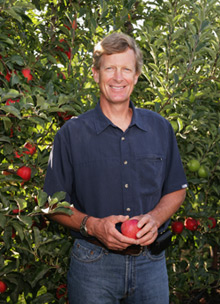Washington’s fight over GMO labeling is over—for now— but the broader battle over genetic engineering itself continues as fiercely as ever. Next up on the front lines: The Arctic apple, a non-browning fruit produced by a small company in British Columbia called Okanagan Specialty Fruits.
Responding to this state’s election results on labeling Initiative 522, Friends of the Earth issued a statement today reiterating its opposition to the genetically-engineered Arctic and releasing two letters it received from McDonald’s and Gerber baby food parent corporation Nestle. Both companies said they had no plans to use the Arctic apple, which is currently seeking regulatory approval from American and Canadian authorities.
“Companies invested in profits from GMOs might have bought Washington’s election, but they can’t stop the market from rejecting their products,” asserts Lisa Archer, director of Friends of the Earth’s food and technology program. The election-buying claim is a reference to the $20 million spent by the No on 522 campaign, nearly twice as much as labeling supporters. The expenditures on both sides made this the costliest initiative fight in the state’s history.
Unlike some GMOs that concern activists, Arctic apples do not contain genes from viruses, animals or other plant species. Rather, the fruit is produced through the insertion of four genes from conventional apples that are able to turn off the enzyme that causes browning.
Friends of the Earth, in its statement and accompanying fact-sheet, nevertheless portrays this technology as unnatural, experimental and risky. For one thing, the environmental group claims that the “browning enzyme…may help fight diseases and pests, meaning farmers may have to use even more pesticide in growing the Arctic Apple.” Responds Okanagan Specialty Fruit president Neil Carter: “That’s complete crap.” He says the company has been growing Arctic apples for years in field trials and that “they’ve never shown any increased susceptibility to pest and disease.”
Neither McDonald’s nor Nestle weigh in on such questions in their letters. Indeed, Nestle notes that some of Gerber’s products use ingredients derived from GM crops and points out that the FDA has given genetically-modified foods its blessing. And the company’s letters do not rule out the possibility that they may use Arctic apples in the future.
Consider, for contrast, the statements made by PCC and a number of other stores this spring, definitively saying they would not carry genetically-modified salmon should it get regulatory approval.
Reached by Seattle Weekly for further clarification, Nestle spokesperson Elizabeth Velez says this via e-mail: “We require specialized apple varieties in our products and Artic apples is not one of them.” It’s a statement that doesn’t exactly put Nestle in the anti-Arctic apple camp.
A McDonald’s spokespeople couldn’t be reached for comment as of this posting.
Whatever their beliefs about GMOs, both companies are obviously attempting to protect their image among consumers. In a New York Times
poll conducted earlier this year, three-quarters of respondents expressed concerns about GMOs, “with most of them worried about the effects on people’s health,” according to the paper.








